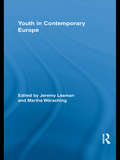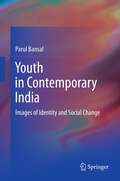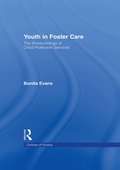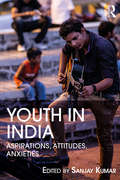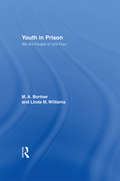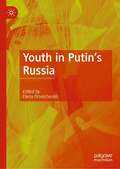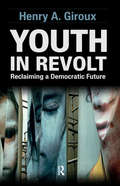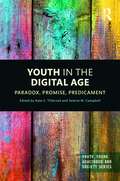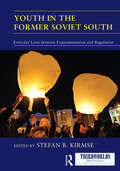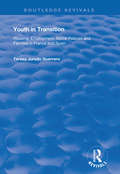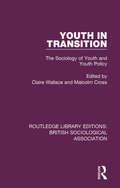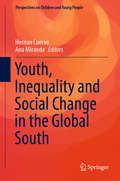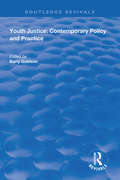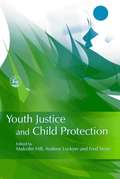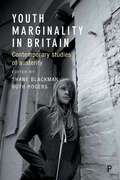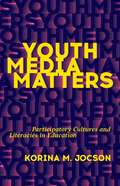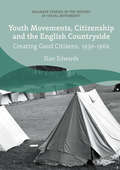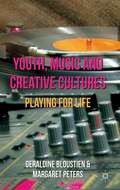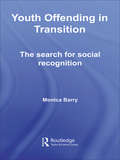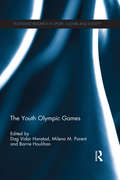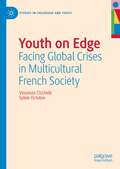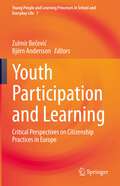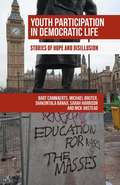- Table View
- List View
Youth in Contemporary Europe (Routledge Advances in Sociology)
by Jeremy LeamanThis book examines the everyday living conditions experienced and also shaped by young people in Europe. Contributors reflect on the current context of economic, social and political change affecting youth in the critical transition from dependence to independence. The volume provides the reader with a multi-dimensional and interdisciplinary view of youth cultures, drawn from a variety of recent research throughout the continent.
Youth in Contemporary India
by Parul BansalThis book endeavors to be a study of identity in Indian urban youth. It is concerned with understanding the psychological themes of conformity, rebellion, individuation, relatedness, initiative and ideological values which pervade youths' search for identity within the Indian cultural milieu, specifically the Indian family. In its essence, the book attempts to explore how in contemporary India the emerging sense of individuality in youth is seeking its own balance of relationality with parental figures and cohesion with social order. The research questions are addressed to two groups of young men and women in the age group of 20-29 years-Youth in Corporate sector and Youth in Non Profit sector. Methodologically, the study is a psychoanalytically informed, process oriented, context sensitive work that proceeds via narrations, conversations and in-depth life stories of young men and women. Overall, the text reflects on the nature of inter-generational continuity and shifts in India.
Youth in Foster Care: The Shortcomings of Child Protection Services (Children of Poverty)
by Bonita EvansFirst published in 1998. Routledge is an imprint of Taylor & Francis, an informa company.
Youth in India: Aspirations, Attitudes, Anxieties
by Sanjay KumarThis book explores the attitudes, anxieties and aspirations of India’s burgeoning young population in a globalised world. Drawing upon time-series survey data of the Indian youth aged between 15 and 34 years across 19 Indian states, it provides key insights into a range of themes along with an overview of the changing trends and patterns of their behaviour. The volume examines the job preferences of the Indian youth, their career priorities and opinions on reservations in employment and education sectors. It measures their degree of political participation and studies their attitude regarding political issues. It looks at aspects relating to their social and cultural contexts, preferences and practices, including lifestyle choices, consumption habits and social customs such as marriage, as they negotiate between tradition and modernity. Further, it discusses the anxieties and insecurities that the youth face, their mental health and their experiences of social discrimination. The essays here offer an understanding of a critical demographic and shed light on the challenges and opportunities that the Indian youth confront today. Lucid, accessible and empirically grounded, this volume will be useful to scholars and researchers of sociology, political sociology, political studies, youth psychology and anthropology as well as policymakers, journalists and the interested general reader.
Youth in Prison: We the People of Unit Four
by M. A. Bortner Linda WilliamsBased on two years of intensive research in a juvenile prison, this study tells the story of youths in a "model program," created after a class action lawsuit for inhumane and illegal practices. It captures their lives inside and outside of prison: from drugs, gangs and criminal behaviour to the realities of families, schools and neighbourhoods. Drawing on experience that encompasses 20 years of juvenile justice research and policy analysis, the authors scrutinize the prison's attempts to combine accountability and treatment for youths with protection for the public, situating these within the larger social and political context.
Youth in Putin's Russia
by Elena OmelchenkoThis edited volume sheds light on the lives of young people in various central and peripheral regions of Russia, including youth belonging to different ethnic and religious groups and who have differing views on contemporary politics. While the literature continues to grow regarding the inclusion of youth in global contexts, the specific cultural, political, and economic circumstances of being young in Russia make the Russian case unique. Chapter authors focus on four key aspects that characterize the youth experience in contemporary Russia: cultural practices and value affiliations, citizenship and patriotism, ethnic and religious diversity, and the labor market. This collection will appeal to readers interested in contemporary life in Russia and looking for the latest empirical material on youth identities and cultures, as well as those looking to learn about the critical viewpoint of local academics regarding the ongoing processes in contemporary Russian society.
Youth in Revolt: Reclaiming a Democratic Future (Critical Interventions)
by Henry A. GirouxRecently, American youth have demonstrated en masse about a variety of issues ranging from economic injustice and massive inequality to drastic cuts in education and public services. Youth in Revolt chronicles the escalating backlash against dissent and peaceful protest while exposing a lack of governmental concern for society's most vulnerable populations. Henry Giroux carefully documents a wide range of phenomena, from pervasive violent imagery in our popular culture to educational racism, censorship, and the growing economic inequality we face. He challenges the reader to consider the hope for democratic renewal embodied by Occupy Wall Street and other emerging movements. Encouraging a capacity for critical thought, compassion, and informed judgment, Giroux's analysis allows us to rethink the very nature of what democracy means and what it might look like in the United States and beyond.
Youth in the Digital Age: Paradox, Promise, Predicament (Youth, Young Adulthood and Society)
by Kate C Tilleczek Valerie M CampbellYoung people spend a significant amount of time with technology, particularly digital and social media. How do they experience and cope with the many influences of digital media in their lives? What are the main challenges and opportunities they navigate in living online? Youth in the Digital Age provides answers from a decidedly interdisciplinary perspective, beginning in a framework steeped in context; biography; and societal influences on young people, who now make up 25% of the earth’s population. Placing these perspectives alongside those of current scholars and commentators to help analyse what young people are up against in navigating the digital age, the volume also draws on data from a five-year research project (Digital Media and Young Lives). Topics explored include well-being, privacy, control, surveillance, digital capital, and social relationships. Based on unique and emergent research from Canada, Scotland, and Australia, Youth in the Digital Age will appeal to post-secondary educators and scholars interested in fields such as youth studies, education, media studies, mental health, and technology.
Youth in the Former Soviet South: Everyday Lives between Experimentation and Regulation (ISSN)
by Stefan B. KirmseThis book offers the first comprehensive analysis of youth, in all its diversity, in Muslim Central Asia and the Caucasus. It brings together a range of academic perspectives, including media studies, Islamic studies, the sociology of youth, and social anthropology. While most discussions of youth in the former Soviet South frame the younger generation as victims of crisis, as targets of state policy, or as holy warriors, this book maps out the complexity and variance of everyday lives under post-Soviet conditions. Youth is not a clear-cut, predictable life stage. Yet, across the region, young people’s lives show forms of experimentation and regulation. Male and female youth explore new opportunities not only in the buzzing space of the city, but also in the more closely monitored neighbourhood of their family homes. At the same time, they are constrained by communal expectations, ethnic affiliation, urban or rural background and by gender and sexuality. While young people are more dependent and monitored than many others, they are also more eager to explore and challenge. In many ways, they stand at the cutting edge of globalization and post-Soviet change, and thus they offer innovative perspectives on these processes. This book was published as a special issue of Central Asian Survey.
Youth in the Roman Empire
by Christian Laes Johan StrubbeModern society has a negative view of youth as a period of storm and stress, but at the same time cherishes the idea of eternal youth. How does this compare with ancient Roman society? Did a phase of youth exist there with its own characteristics? How was youth appreciated? This book studies the lives and the image of youngsters (around 15-25 years of age) in the Latin West and the Greek East in the Roman period. Boys and girls of all social classes come to the fore; their lives, public and private, are sketched with the help of a range of textual and documentary sources, while the authors also employ the results of recent neuropsychological research. The result is a highly readable and wide-ranging account of how the crucial transition between childhood and adulthood operated in the Roman world.
Youth in Transition: Housing, Employment, Social Policies and Families in France and Spain (Routledge Revivals)
by Teresa Jurado GuerreroThis title was first published in 2002: In recent years there has been a trend among young people across Europe towards remaining longer in their parental homes. Many reasons have been suggested for this change in demographic patterns, but Teresa Jurado Guerrero’s study of France and Spain represents the first in-depth cross-national analysis of this important social and economic issue. The book provides systematic comparisons of living arrangements at cross-national, cross-regional and individual levels and examines the results of two large-scale national surveys. It investigates the relevance of young people’s employment situations, social policies related to youth, national and regional housing markets and family norms, and identifies policy measures which would encourage early home-leaving and family formation. The book exposes the existence and effects of different national and individual strategies surrounding the process of becoming socially independent, and offers unique insights into an issue of key relevance for parents, young people, researchers and policy makers.
Youth in Transition: The Sociology of Youth and Youth Policy (Routledge Library Editions: British Sociological Association #6)
by Claire Wallace Malcolm CrossOriginally published in 1990, Youth in Transition addresses the issue of large-scale policy intervention, related to problems of employment in Britain’s youth. The book reflects the changes within sociology from studying youth as self-contained instigators of change, to examining the role they have come to play as the target of official, rather than popular or media attention. Changes in youth experience are affecting family relations and dependence or creating homelessness, regional economic disparities, demographic changes and training and employment opportunities, present a new model of youth and re-define its status. The book brings together original work in the field of youth and youth policy in the ‘80s and ‘90s.
Youth, Inequality and Social Change in the Global South (Perspectives on Children and Young People #6)
by Hernan Cuervo Ana MirandaThis book gathers international and interdisciplinary work on youth studies from the Global South, exploring issues such as continuity and change in youth transitions from education to work; contemporary debates on the impact of mobility, marginalization and violence on young lives; how digital technologies shape youth experiences; and how different institutions, cultures and structures generate a diversity of experiences of what it means to be young. The book is divided into four broad thematic sections: (a) Education, work and social structure; (b) Identity and belonging; (c) Place, mobilities and marginalization; and (d) Power, social conflict and new forms of political participation of youth.
Youth Justice: Contemporary Policy and Practice (Routledge Revivals)
by Barry GoldsonPublished in 1999, the aim of this text is to offer a critical analysis of contemporary policy and practice in relation to children and crime. It provides an integrated edited text combining a critical commentary of contemporary social/criminal justice policy with analyses of progressive practice in the UK. It offers coverage of each discrete stage in the processing of "child offenders" in the criminal justice system. It develops an alternative policy and practice framework drawing on experience from the UK, Europe, the USA, Canada, Australia and New Zealand.
Youth Justice and Child Protection
by Malcolm Hill Andrew Lockyer Fred StoneThis book is an examination of recent developments in the areas of youth justice and child protection. It investigates how well young people and the societies in which they live are served by judicial and service systems. Consideration is given to those in care - in young offenders' institutions, foster families and residential homes - as well as those living with their families. A broad range of international experts discuss the largely segregated youth justice and children's legal and service systems in England and Wales, other parts of Western Europe and the US, and compare these with Scotland's integrated system. The implications of these arrangements are considered for the rights of children and parents on the one hand and society on the other. The contributors also provide insights into the rationale for current and proposed policies, as well as the efficacy of different systems. This book will be an important reference for policy-makers, social workers, lawyers, magistrates and equivalent decision makers, health professionals, carers, and all those working in youth justice and child protection. It is highly relevant for academics and students interested in children, citizenship, youth crime, child welfare and state-family relations.
Youth Marginality in Britain: Contemporary Studies of Austerity
by Shane Blackman and Ruth RogersTabloid headlines such as ‘Anti-social Feral Youth,’ ‘Vile Products of Welfare in the UK’ and ‘One in Four Adolescents is a Criminal’ have in recent years obscured understanding of what social justice means for young people and how they experience it. Youth marginality in Britain offers a new perspective by promoting young people’s voices and understanding the agency behind their actions. It explores different forms of social marginalisation within media, culture and society, focusing on how young people experience social discrimination at a personal and collective level. This collection from a wide range of expert contributors showcases contemporary research on multiple youth deprivation of personal isolation, social hardship, gender and ethnic discrimination and social stigma. With a foreword from Robert MacDonald, it explores the intersection of race, gender, class, asylum seeker status and care leavers in Britain, placing them in the broader context of austerity, poverty and inequality to highlight both change and continuity within young people’s social and cultural identities. This timely contribution to debates concerning youth austerity in Britain is suitable for students across youth studies, sociology, education, criminology, youth work and social policy.
Youth Media Matters: Participatory Cultures and Literacies in Education
by Korina M. JocsonIn an information age of youth social movements, Youth Media Matters examines how young people are using new media technologies to tell stories about themselves and their social worlds. They do so through joint efforts in a range of educational settings and media environments, including high school classrooms, youth media organizations, and social media sites. Korina M. Jocson draws on various theories to show how educators can harness the power of youth media to provide new opportunities for meaningful learning and “do-it-together production.” Describing the impact that youth media can have on the broader culture, Jocson demonstrates how it supports expansive literacy practices and promotes civic engagement, particularly among historically marginalized youth.In Youth Media Matters, Jocson offers a connective analysis of content area classrooms, career and technical education, literary and media arts organizations, community television stations, and colleges and universities. She provides examples of youth media work—including videos, television broadcasts, websites, and blogs—produced in the San Francisco Bay Area, Los Angeles, New York, and St. Louis. At a time when educators are increasingly attentive to participatory cultures yet constrained by top-down pedagogical requirements, Jocson highlights the knowledge production and transformative potential of youth media with import both in and out of the classroom.
Youth Movements, Citizenship and the English Countryside: Creating Good Citizens, 1930-1960 (Palgrave Studies in the History of Social Movements)
by Sian EdwardsThis book explores the significance and meaning of the countryside within mid-twentieth century youth movements. It examines the ways in which the Boy Scouts, Girl Guides, Woodcraft Folk and Young Farmers' Club organisations employed the countryside as a space within which 'good citizenship' - in leisure, work, the home and the community - could be developed. Mid-century youth movements identified the 'problem' of modern youth as a predominantly urban and working class issue. They held that the countryside offered an effective antidote to these problems: being a 'good citizen' within this context necessitated a respectful and mutually beneficial relationship with the rural sphere. Avenues to good citizenship could be found through an enthusiasm for outdoor recreation, the stewardship of the countryside and work on the land. However, models of good citizenship were intrinsically gendered.
Youth, Multiculturalism and Community Cohesion
by Paul ThomasSince the 2001 'race riots' in the north of England, and the 7/7 London bombings, Britain has appeared to reject multiculturalism. It has instead prioritized a new policy of 'Community Cohesion' that calls for a focus on common needs and shared British identity, rather than on ethnic and religious differences. This has proved a controversial agenda, apparently downplaying the reality of racism and ethnic diversity, and leading to one critic calling it 'the death of multiculturalism'. Little evidence has emerged so far on what Community Cohesion actually represents, but this book addresses that deficit by drawing on empirical research around work with young people to analyse the meaning and practice of British Community Cohesion policies, youth identities in racially-tense areas, and government's attempts to 'prevent violent extremism' amongst young Muslims. It concludes that Community Cohesion is a new phase of multiculturalism, not its death.
Youth, Music and Creative Cultures
by Geraldine Bloustien Margaret PetersYouth, Music and Creative Cultures demonstrates the power of music in the lives of many disadvantaged youth. It offers an evocative cross-cultural exploration into the everyday lives and music practices of young people from seven very different urban locales in Australia, the UK, the US and Europe. They document their passion for music from their own broad social, cultural and ethnic perspectives, using their own video and camera footage to reflect on their learning processes and music activities. These narratives, alongside the views and observations of their peers and mentors, are presented in a dialogic format that both supports and challenges the views and analysis of the authors.
Youth Offending in Transition: The Search for Social Recognition
by Monica BarryTaking a new approach to youth crime, this book argues that the transition from childhood to adulthood can be an isolating and disempowering experience for young people. Children and young people are inherently vulnerable because of their age and status – they are a minority group, with the potential for being exploited, discriminated against, dominated and disrespected by adults. Youth Offending in Transition explores how their treatment by adult society may lead young people to resort to crime as a means of gaining respect from their peers. Using concepts of capital and the narratives of young offenders themselves, this book is based on original research into the reasons why young people start and stop offending. It discusses the following topics: criminal theory and the significance of youth transitions to the ‘age-crime curve’ social identity and reputation amongst young people social inequalities and their influence on youth transitions the criminalization and discrimination of young people by adults the importance of social recognition in reducing offending.
The Youth Olympic Games (Routledge Research in Sport, Culture and Society)
by Barrie Houlihan Milena M. Parent Dag Vidar HanstadThe first summer Youth Olympic Games (YOG) were held in Singapore in 2010 and the first winter Youth Olympic Games in Innsbruck in 2012. The IOC hopes that the YOG will encourage young people to be more active and that they will bring the Olympic movement closer to its original founding values. This is the first book to be published on the Youth Olympic Games. It critically examines the origins of the Games and the motives of the Games organisers, as well as the organisation and management of the Games and their wider impact and significance. The first part of the book discusses the relationship between the YOG and the ideology of Olympism, in the context of broader developments in youth sport competitions. The second part investigates a wide range of managerial aspects including the bidding process, finance, the prominent role of young people on the organising committees and as volunteers, the role of media and sponsors, and the distinctive competition structure. The final part of the book assesses the current and likely future impact of the YOG on the host cities and countries, the IOC and on national youth sport policies. The Youth Olympic Games is essential reading for any researcher, advanced student or policy maker with an interest in Olympic Studies, sports development, sport policy, youth sport or event management.
Youth on Edge: Facing Global Crises in Multicultural French Society (Studies in Childhood and Youth)
by Vincenzo Cicchelli Sylvie OctobreThis book explores disrupted youth cohesion in France within the context of multiple ongoing global economic, migratory, social, political, and security-related crises. While these trends can be observed in numerous Western societies, France provides a unique case study of various anti-cosmopolitan and anti-Enlightenment movements shaping youth conditions and reconfiguring relationships between the individual, the group, and society. The authors undertook in-depth interviews with French young people between the ages of 18 to 30 years old to inquire into how they experience "vivre ensemble" (living together) in a time of rising economic inequalities and multicultural tensions. Through these findings, they invite decision-makers, politicians, educators, and parents to propose a renewed narrative of social cohesion for youth who are not disillusioned, but deeply on edge.
Youth Participation and Learning: Critical Perspectives on Citizenship Practices in Europe (Young People and Learning Processes in School and Everyday Life #7)
by Zulmir Bečević Björn AnderssonThis book contributes to the studies on learning processes occurring outside “traditional” socialization settings such as family and school, by analysing civic and political participation and learning experiences. In this perspective, the book delves into the connections between the concepts of learning and participation and, in various ways and from different perspectives, critically interrogates learning and participation as interrelated phenomena, with the aim of revealing complexities implicated in pathways to adulthood. Being interdisciplinary in its nature (contributors come from disciplinary backgrounds such as educational sciences, child and youth studies, social work, sociology and political science), the volume provides an up-to date analysis of contemporary issues connected to youth participation and learning. The work taps into central areas of everyday life of young people and youth meaning-making and generates and presents qualitative knowledge about what it means to be young in Europe today.
Youth Participation in Democratic Life: Stories of Hope and Disillusion
by Bart Cammaerts Michael Bruter Shakuntala Banaji Sarah Harrison Nick Anstead Whitwell ByrtThis book is concerned with the contexts, nature and quality of the participation of young people in European democratic life. The authors understand democracy broadly as both institutional politics and civic cultures, and a wide range of methods are used to analyse and assess youth participation and attitudes.
